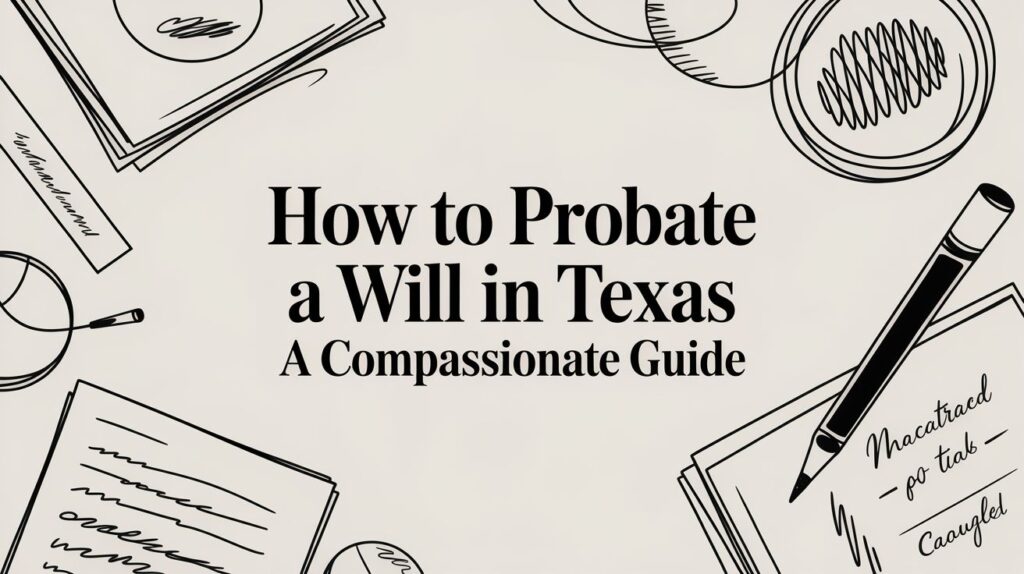Understanding the Texas Probate Process: A Step-by-Step Guide
The Texas probate process can be complex and daunting for those unfamiliar with legal procedures. This guide aims to simplify the process, outlining each step from filing the will to distributing assets among beneficiaries. Understanding these stages can help individuals navigate the probate system more effectively.
Key steps in the Texas probate process include filing the will with the court, notifying heirs and beneficiaries, inventorying the estate's assets, paying debts and taxes, and finally distributing the remaining assets. Each step has specific legal requirements and timelines, making it crucial to seek professional guidance to ensure compliance with Texas law.
Common Challenges in Texas Probate: Navigating Disputes and Delays
Probate can sometimes lead to disputes among family members or beneficiaries, often arising from misunderstandings or disagreements over the will's terms. This section will explore common challenges that individuals may face during the probate process and offer strategies for resolution.
Delays in probate can also occur due to contested wills, missing heirs, or complex asset distributions. Engaging a knowledgeable probate attorney can help mitigate these issues, ensuring a smoother process and minimizing the potential for conflict among family members.
Probate vs. Non-Probate Assets in Texas: What You Need to Know
Understanding the difference between probate and non-probate assets is essential for effective estate planning. Probate assets are those that must go through the court process, while non-probate assets can pass directly to beneficiaries without court involvement.
Examples of non-probate assets include life insurance policies, retirement accounts, and property held in trust. Recognizing these distinctions can assist individuals in planning their estates more efficiently, potentially reducing the time and costs associated with probate.
Estate Planning Essentials: Creating a Will in Texas
Creating a will is a fundamental component of estate planning in Texas. This section discusses the essential elements of a valid will and the steps needed to ensure it reflects the individual's wishes accurately.
In Texas, a will must be in writing, signed by the testator, and witnessed by at least two individuals who are not beneficiaries. Additionally, individuals should consider updating their wills periodically to account for changes in their circumstances, such as marriage, divorce, or the birth of children.
Understanding the Texas Probate Process: A Step-by-Step Guide
The Texas probate process can be complex and daunting for those unfamiliar with legal procedures. This guide aims to simplify the process, outlining each step from filing the will to distributing assets among beneficiaries. Understanding these stages can help individuals navigate the probate system more effectively.
Key steps in the Texas probate process include filing the will with the court, notifying heirs and beneficiaries, inventorying the estate's assets, paying debts and taxes, and finally distributing the remaining assets. Each step has specific legal requirements and timelines, making it crucial to seek professional guidance to ensure compliance with Texas law.
Common Challenges in Texas Probate: Navigating Disputes and Delays
Probate can sometimes lead to disputes among family members or beneficiaries, often arising from misunderstandings or disagreements over the will's terms. This section will explore common challenges that individuals may face during the probate process and offer strategies for resolution.
Delays in probate can also occur due to contested wills, missing heirs, or complex asset distributions. Engaging a knowledgeable probate attorney can help mitigate these issues, ensuring a smoother process and minimizing the potential for conflict among family members.
Probate vs. Non-Probate Assets in Texas: What You Need to Know
Understanding the difference between probate and non-probate assets is essential for effective estate planning. Probate assets are those that must go through the court process, while non-probate assets can pass directly to beneficiaries without court involvement.
Examples of non-probate assets include life insurance policies, retirement accounts, and property held in trust. Recognizing these distinctions can assist individuals in planning their estates more efficiently, potentially reducing the time and costs associated with probate.
Estate Planning Essentials: Creating a Will in Texas
Creating a will is a fundamental component of estate planning in Texas. This section discusses the essential elements of a valid will and the steps needed to ensure it reflects the individual's wishes accurately.
In Texas, a will must be in writing, signed by the testator, and witnessed by at least two individuals who are not beneficiaries. Additionally, individuals should consider updating their wills periodically to account for changes in their circumstances, such as marriage, divorce, or the birth of children.











